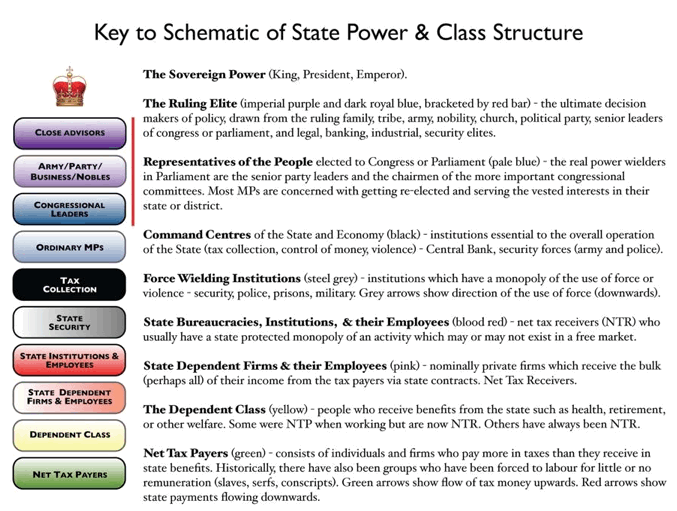Liberty Matters
Social Class and the Means of Production
 Social class in the Marxist and related traditions is constituted by relationships to the means of production, so that the ruling class just is the class that owns the means of production. The state, on this view, serves as the executive committee of the ruling class and safeguards the property rights claimed by this class. By contrast, social class in the classical-liberal-cum-libertarian tradition is constituted by relationships with predatory power. Does this mean that, on this view, answers to questions about the means of production are irrelevant to identifying the ruling class and the associated upper and upper-middle classes or to understanding class dynamics and class rule?
Social class in the Marxist and related traditions is constituted by relationships to the means of production, so that the ruling class just is the class that owns the means of production. The state, on this view, serves as the executive committee of the ruling class and safeguards the property rights claimed by this class. By contrast, social class in the classical-liberal-cum-libertarian tradition is constituted by relationships with predatory power. Does this mean that, on this view, answers to questions about the means of production are irrelevant to identifying the ruling class and the associated upper and upper-middle classes or to understanding class dynamics and class rule?The short answer is no.
(i) For CLCA (to use Hart’s helpful abbreviation), ownership of the means of production will sometimes serve as a signal of class position. While class position is not constituted by ownership of the means of production, a relationship with predatory—ordinarily state—power increases the odds that someone will have access to the means of production. This is true for multiple reasons. (a) The state may directly present someone with monopoly privileges, privileges without which ownership of this or that productive asset would be legally impermissible. (b) The state may use confiscatory power to acquire a productive asset and transfer it to a favored person. (c) Someone may be able to pay for the acquisition and maintenance of a productive asset precisely because she has received a contract from the state the fulfillment of which involves using the asset. (d) Someone may be able to acquire and maintain a productive asset simply because she is wealthy in virtue of state-secured privilege. (e) An intimate relationship with the state may further access to social networks that facilitate acquisition and maintenance of productive assets. (f) Politicians and senior bureaucrats can use their positions of state power, and so of class position, to acquire productive assets or the resources needed to acquire such assets, and so, even if they are not already wealthy, to become owners of the means of production in virtue of their preexisting state positions.
(ii) It will also be true for CLCA that access to the means of production may give someone access to state power and thus to state-secured privilege. This will be true for multiple reasons. (a) Wealth, even legitimately acquired wealth, may be used directly to exert influence on state actors. (b) Business relationships with the state will facilitate access to state actors, and simple access can enhance influence. (c) Business relationships with the state can create indirect opportunities for those who own the means of production to do nonmonetary favors for state actors in their official and unofficial capacities. (d) Wealth can be used to influence the climate of public debate in ways that influence state actors to confer privileges on holders of productive assets.
Thus, while for CLCA one is not a member of the ruling class or its satellite classes simply in virtue of owning productive assets, owning productive assets can serve as a pathway to membership in the ruling class or its satellite classes and as evidence that one belongs to these classes. Proponents of CLCA can agree, therefore, with Marxist theories and their cousins that talk about ownership of the means of production and talk about class belong together.
This helps to explain why CLCA can readily find common ground with populist movements like Occupy! or the original Tea Party. While CLCA has no commitment to the idea that wealth inequality as such is morally or politically objectionable, it can regard actually existing inequalities as frequently problematic for two reasons. (a) These inequalities not infrequently result from state-secured privileges. (b) They also can be and not infrequently are used to facilitate the acquisition of such privileges. Thus, while not all inequalities are objectionable from the perspective of CLCA, many actually existing ones will be. Proponents of CLCA will wish sharply to distinguish wealth acquired peacefully through the direct or indirect satisfaction of consumers from wealth acquired primarily as a result of state-secured privilege, and will not wish to endorse the politics of envy practiced by some populists. But they can and should join with populists in condemning those inequalities that result from state-secured privilege.
Copyright and Fair Use Statement
“Liberty Matters” is the copyright of Liberty Fund, Inc. This material is put on line to further the educational goals of Liberty Fund, Inc. These essays and responses may be quoted and otherwise used under “fair use” provisions for educational and academic purposes. To reprint these essays in course booklets requires the prior permission of Liberty Fund, Inc. Please contact oll@libertyfund.org if you have any questions.